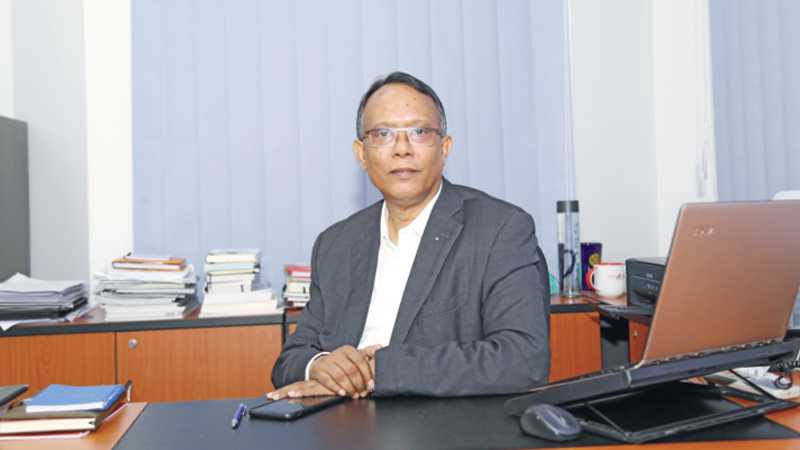Bangladesh is on track to embrace new technologies

Describing the telecom industry as “a highly regulated” one, TIM Nurul Kabir, the outgoing chief executive officer (CEO) of the Association of Mobile Telecom Operators of Bangladesh (AMTOB), said “nothing takes place here without a bit of research”.
He, however, said Bangladesh still “has miles to go” as regards tapping the full potential of research and analysis in the telecom sector.
On Sunday, Kabir spent his last day at the AMTOB office in Gulshan as its CEO and secretary-general. Decked up in a dark grey suit and a white shirt, he was in his business-as-usual mode when The Independent went to visit him.
“I have something in mind…” he replied when asked “what’s next” for him.
In his six-year-long stint at the AMTOB, Kabir played an instrumental role in making AMTOB a strong voice.
“I can say that AMTOB is now a highly accepted organisation among the stakeholders. That’s something I’m very proud of.”
“I, however, want it to focus more on research and analysis, so that more informed decisions can be taken while formulating new policies or guidelines.”
According to Kabir, he has played the role of a policy adviser to the industry while, at the same time, working as a catalyst for the industry’s relationship with the government.
“Basically, my objective throughout was to find out how it would be beneficial for the government, the state, the customers and, of course, for the industry. My primary goal was to help chalk out the policy and regulatory framework for a win-win situation, so that the country and the industry can reap mutual benefits.”
He said the telecom industry had given its best when a decision or a policy was taken, based on thorough analysis and discussion, facilitated by a trade body like AMTOB.
When asked whether the recent government decision to impose a uniform call rate—something which has created discontent among a number of subscribers as well as among the operators—was also consulted by the industry stakeholders, Kabir replied, “In this case, the regulator conducted studies on its own. It fixed the price based on its own analysis.”
“As a regulator, it has to follow certain procedures. The result of the analysis conducted by the operators as well as the Bangladesh Telecommu-nication Regulatory Commission (BTRC), however, showed that the price didn’t really rise that much.”
He said the uniform call rate is not meant to give any added advantage to any operator. The BTRC did this as it wanted to elevate the market to a level playing position, which would help promote healthy competition.
Kabir said the competition among the operators is now taking place on the quality of service (QoS). “It’s simple. The customer will choose that service that gives them the highest quality from the operators.”
Earlier, telecom was “just about quality voice service”, but now it has become a “multi-dimensional service”.
After the arrival of 4G, he said, people are now attracted more towards “data in comparison with voice service”.
“The demand for voice is decreasing and people want to use data. This is no longer just a telephone industry—rather, it’s a digital service provider industry.”
According to Kabir, the mobile network by itself is an instrument that works as an enabler. “Times have changed and the government should promote policy to embrace the changing times. The digital services enabled by a smartphone are the vehicle for that change. Hence, the use of smartphones should be encouraged and made affordable at the customer level.”
He said smartphone penetration in our country is 40 per cent, among which the number of 4G-enabled handsets is very small, even though the country has rolled out 4G technology across the country. “If you take a look at Myanmar, smartphone penetration is 75 per cent there, whereas we still have 60 per cent of people using feature phones or basic phones.”
Kabir said technology is advancing very rapidly around the world. For example, he explained, it took 120 years from the first industrial revolution to the second industrial revolution, 80 years from the second industrial revolution to the third. But it took only took 20 years to arrive at the fourth industrial revolution, which is technology-based.
“These developments are happening so quickly. Now we are talking about artificial intelligence, internet of things (IoT), big data and robotics for the future. All these are the result of technology.”
Bangladesh is on the right track to embrace the new technological developments, he said. “The idea of starting the Digital Bangladesh campaign by this government 10 years ago was a great idea. The plan or the vision of that campaign was to give momentum, and it has succeeded in doing so.”
“This is because in the past one decade, Bangladesh has done wonders in establishing connectivity. The mobile industry paved the highway of technology, because of which people even at the root level are being connected.”
“The World Bank has said 10 per cent penetration in broadband brings 1.2 per cent growth in the GDP. What does it mean? It means that the more we invest in technology, in increasing penetration, usage and connectivity, the more we head towards a digital society.”
Source: http://m.theindependentbd.com